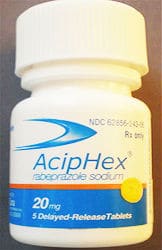
Free Confidential Lawsuit Evaluation: If you or a loved one was injured, you should contact our law firm immediately. You may be entitled to compensation by filing a suit and our lawyers can help.
Overview
Aciphex (generic: rabeprazole) is a PPI drug that decreases the amount of acid produced by the stomach. The medication is used to treat the symptoms of gastroesophageal reflux disease (GERD) in adults and children who are at least 1-year-old, and may be prescribed to adults only to treat conditions involving excessive stomach acid, such as Zollinger-Ellison syndrome, or to promote healing of duodenal ulcers and erosive esophagitis (damage to the esophagus caused by stomach acid). Aciphex is made by Eisai Inc., and was approved by the U.S. Food & Drug Administration (FDA) in February 2002.
What’s the Problem?
Acute interstitial nephritis (AIN) is characterized by swelling in between the kidney tubules, and proton pump inhibitor therapy is suspected to be a leading cause of the condition. The first case of AIN specifically linked to Aciphex in the U.S. was reported in 2005. At least 4 cases have been associated with the medication in Canada, as well as one in France. As a result of these problems, in December 2015, the FDA announced that it had updated Aciphex warning labels to include information about the increased risk of acute interstitial nephritis.
Nephritis Symptoms
Signs and symptoms of acute interstitial nephritis include:
- Blood in the urine
- Fever
- Increased or decreased urine output
- Mental status changes (drowsiness, confusion, coma)
- Nausea
- Vomiting
- Rash
- Swelling of the body
- Weight gain
Treatment
Treatment for acute interstitial nephritis depends on what’s causing the problem. Avoiding Aciphex and other proton pump inhibitors may relieve symptoms quickly. Limiting salt and fluids can help improve swelling and high blood pressure (hypertension), and reducing protein intake can help control the buildup of waste products in the blood that can lead to symptoms of acute kidney failure. Corticosteroids or stronger anti-inflammatory drugs such as cyclophosphamide can also be helpful in some cases.
Other Causes of AIN
In addition to the potential increased risk posed by proton pump inhibitors, nephritis may also be caused by:
- Autoimmune disorders
- Infections
- Long-term use of acetaminophen (Tylenol), aspirin, and nonsteroidal anti-inflammatory drugs (NSAIDS)
- Antibiotics (including penicillin, ampicillin, methicillin, sulfonamide medications, and others)
- Too little potassium in the blood
- Too much calcium or uric acid in the blood
Do I Have an Aciphex Acute Interstitial Nephritis Lawsuit?
The Class Action Litigation Group at our law firm is an experienced team of trial lawyers that focus on the representation of plaintiffs in Aciphex lawsuits. We are handling individual litigation nationwide and currently accepting new nephritis cases in all 50 states.
Free Confidential Case Evaluation: Again, if you were diagnosed with acute interstitial nephritis after taking Aciphex, you should contact our law firm immediately. You may be entitled to a settlement by filing a suit and we can help.
